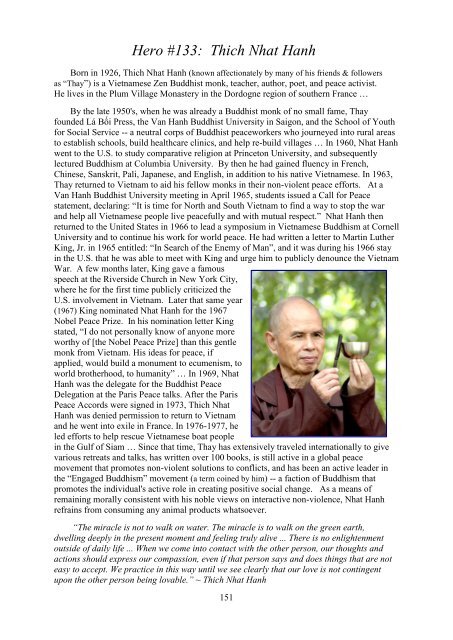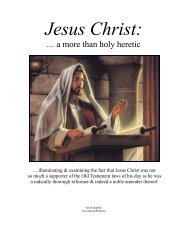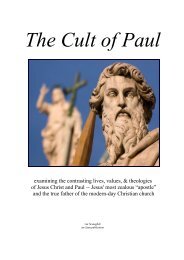In LOVE with Humanity
A tribute to some of humanity’s greatest Heroes; 153 men & women who have chosen, via their brave words &/or noble deeds, to reflect the deeper Greatness residing within us all
A tribute to some of humanity’s greatest Heroes; 153 men & women who have chosen, via their brave words &/or noble deeds, to reflect the deeper Greatness residing within us all
You also want an ePaper? Increase the reach of your titles
YUMPU automatically turns print PDFs into web optimized ePapers that Google loves.
Hero #133: Thich Nhat Hanh<br />
Born in 1926, Thich Nhat Hanh (known affectionately by many of his friends & followers<br />
as ―Thay‖) is a Vietnamese Zen Buddhist monk, teacher, author, poet, and peace activist.<br />
He lives in the Plum Village Monastery in the Dordogne region of southern France …<br />
By the late 1950's, when he was already a Buddhist monk of no small fame, Thay<br />
founded Lá Bối Press, the Van Hanh Buddhist University in Saigon, and the School of Youth<br />
for Social Service -- a neutral corps of Buddhist peaceworkers who journeyed into rural areas<br />
to establish schools, build healthcare clinics, and help re-build villages … <strong>In</strong> 1960, Nhat Hanh<br />
went to the U.S. to study comparative religion at Princeton University, and subsequently<br />
lectured Buddhism at Columbia University. By then he had gained fluency in French,<br />
Chinese, Sanskrit, Pali, Japanese, and English, in addition to his native Vietnamese. <strong>In</strong> 1963,<br />
Thay returned to Vietnam to aid his fellow monks in their non-violent peace efforts. At a<br />
Van Hanh Buddhist University meeting in April 1965, students issued a Call for Peace<br />
statement, declaring: ―It is time for North and South Vietnam to find a way to stop the war<br />
and help all Vietnamese people live peacefully and <strong>with</strong> mutual respect.‖ Nhat Hanh then<br />
returned to the United States in 1966 to lead a symposium in Vietnamese Buddhism at Cornell<br />
University and to continue his work for world peace. He had written a letter to Martin Luther<br />
King, Jr. in 1965 entitled: ―<strong>In</strong> Search of the Enemy of Man‖, and it was during his 1966 stay<br />
in the U.S. that he was able to meet <strong>with</strong> King and urge him to publicly denounce the Vietnam<br />
War. A few months later, King gave a famous<br />
speech at the Riverside Church in New York City,<br />
where he for the first time publicly criticized the<br />
U.S. involvement in Vietnam. Later that same year<br />
(1967) King nominated Nhat Hanh for the 1967<br />
Nobel Peace Prize. <strong>In</strong> his nomination letter King<br />
stated, ―I do not personally know of anyone more<br />
worthy of [the Nobel Peace Prize] than this gentle<br />
monk from Vietnam. His ideas for peace, if<br />
applied, would build a monument to ecumenism, to<br />
world brotherhood, to humanity‖ … <strong>In</strong> 1969, Nhat<br />
Hanh was the delegate for the Buddhist Peace<br />
Delegation at the Paris Peace talks. After the Paris<br />
Peace Accords were signed in 1973, Thich Nhat<br />
Hanh was denied permission to return to Vietnam<br />
and he went into exile in France. <strong>In</strong> 1976-1977, he<br />
led efforts to help rescue Vietnamese boat people<br />
in the Gulf of Siam … Since that time, Thay has extensively traveled internationally to give<br />
various retreats and talks, has written over 100 books, is still active in a global peace<br />
movement that promotes non-violent solutions to conflicts, and has been an active leader in<br />
the ―Engaged Buddhism‖ movement (a term coined by him) -- a faction of Buddhism that<br />
promotes the individual's active role in creating positive social change. As a means of<br />
remaining morally consistent <strong>with</strong> his noble views on interactive non-violence, Nhat Hanh<br />
refrains from consuming any animal products whatsoever.<br />
―The miracle is not to walk on water. The miracle is to walk on the green earth,<br />
dwelling deeply in the present moment and feeling truly alive ... There is no enlightenment<br />
outside of daily life ... When we come into contact <strong>with</strong> the other person, our thoughts and<br />
actions should express our compassion, even if that person says and does things that are not<br />
easy to accept. We practice in this way until we see clearly that our love is not contingent<br />
upon the other person being lovable.‖ ~ Thich Nhat Hanh<br />
151

















